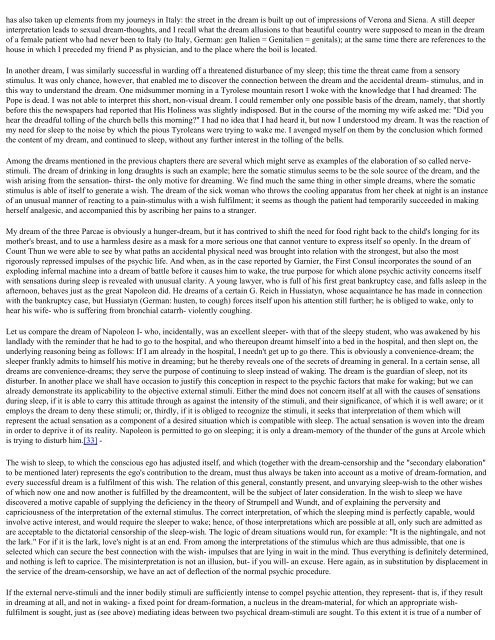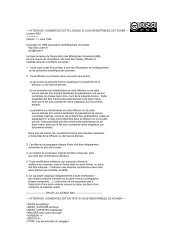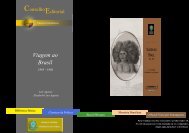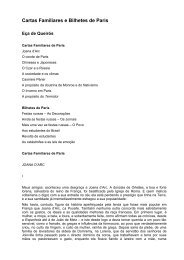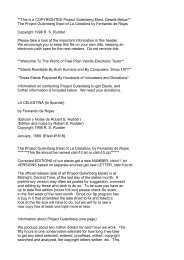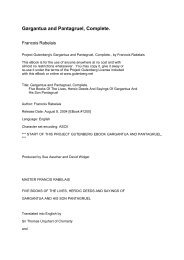The Interpretation of Dreams Sigmund Freud (1900)
The Interpretation of Dreams Sigmund Freud (1900)
The Interpretation of Dreams Sigmund Freud (1900)
You also want an ePaper? Increase the reach of your titles
YUMPU automatically turns print PDFs into web optimized ePapers that Google loves.
has also taken up elements from my journeys in Italy: the street in the dream is built up out <strong>of</strong> impressions <strong>of</strong> Verona and Siena. A still deeper<br />
interpretation leads to sexual dream-thoughts, and I recall what the dream allusions to that beautiful country were supposed to mean in the dream<br />
<strong>of</strong> a female patient who had never been to Italy (to Italy, German: gen Italien = Genitalien = genitals); at the same time there are references to the<br />
house in which I preceded my friend P as physician, and to the place where the boil is located.<br />
In another dream, I was similarly successful in warding <strong>of</strong>f a threatened disturbance <strong>of</strong> my sleep; this time the threat came from a sensory<br />
stimulus. It was only chance, however, that enabled me to discover the connection between the dream and the accidental dream- stimulus, and in<br />
this way to understand the dream. One midsummer morning in a Tyrolese mountain resort I woke with the knowledge that I had dreamed: <strong>The</strong><br />
Pope is dead. I was not able to interpret this short, non-visual dream. I could remember only one possible basis <strong>of</strong> the dream, namely, that shortly<br />
before this the newspapers had reported that His Holiness was slightly indisposed. But in the course <strong>of</strong> the morning my wife asked me: "Did you<br />
hear the dreadful tolling <strong>of</strong> the church bells this morning?" I had no idea that I had heard it, but now I understood my dream. It was the reaction <strong>of</strong><br />
my need for sleep to the noise by which the pious Tyroleans were trying to wake me. I avenged myself on them by the conclusion which formed<br />
the content <strong>of</strong> my dream, and continued to sleep, without any further interest in the tolling <strong>of</strong> the bells.<br />
Among the dreams mentioned in the previous chapters there are several which might serve as examples <strong>of</strong> the elaboration <strong>of</strong> so called nervestimuli.<br />
<strong>The</strong> dream <strong>of</strong> drinking in long draughts is such an example; here the somatic stimulus seems to be the sole source <strong>of</strong> the dream, and the<br />
wish arising from the sensation- thirst- the only motive for dreaming. We find much the same thing in other simple dreams, where the somatic<br />
stimulus is able <strong>of</strong> itself to generate a wish. <strong>The</strong> dream <strong>of</strong> the sick woman who throws the cooling apparatus from her cheek at night is an instance<br />
<strong>of</strong> an unusual manner <strong>of</strong> reacting to a pain-stimulus with a wish fulfilment; it seems as though the patient had temporarily succeeded in making<br />
herself analgesic, and accompanied this by ascribing her pains to a stranger.<br />
My dream <strong>of</strong> the three Parcae is obviously a hunger-dream, but it has contrived to shift the need for food right back to the child's longing for its<br />
mother's breast, and to use a harmless desire as a mask for a more serious one that cannot venture to express itself so openly. In the dream <strong>of</strong><br />
Count Thun we were able to see by what paths an accidental physical need was brought into relation with the strongest, but also the most<br />
rigorously repressed impulses <strong>of</strong> the psychic life. And when, as in the case reported by Garnier, the First Consul incorporates the sound <strong>of</strong> an<br />
exploding infernal machine into a dream <strong>of</strong> battle before it causes him to wake, the true purpose for which alone psychic activity concerns itself<br />
with sensations during sleep is revealed with unusual clarity. A young lawyer, who is full <strong>of</strong> his first great bankruptcy case, and falls asleep in the<br />
afternoon, behaves just as the great Napoleon did. He dreams <strong>of</strong> a certain G. Reich in Hussiatyn, whose acquaintance he has made in connection<br />
with the bankruptcy case, but Hussiatyn (German: husten, to cough) forces itself upon his attention still further; he is obliged to wake, only to<br />
hear his wife- who is suffering from bronchial catarrh- violently coughing.<br />
Let us compare the dream <strong>of</strong> Napoleon I- who, incidentally, was an excellent sleeper- with that <strong>of</strong> the sleepy student, who was awakened by his<br />
landlady with the reminder that he had to go to the hospital, and who thereupon dreamt himself into a bed in the hospital, and then slept on, the<br />
underlying reasoning being as follows: If I am already in the hospital, I needn't get up to go there. This is obviously a convenience-dream; the<br />
sleeper frankly admits to himself his motive in dreaming; but he thereby reveals one <strong>of</strong> the secrets <strong>of</strong> dreaming in general. In a certain sense, all<br />
dreams are convenience-dreams; they serve the purpose <strong>of</strong> continuing to sleep instead <strong>of</strong> waking. <strong>The</strong> dream is the guardian <strong>of</strong> sleep, not its<br />
disturber. In another place we shall have occasion to justify this conception in respect to the psychic factors that make for waking; but we can<br />
already demonstrate its applicability to the objective external stimuli. Either the mind does not concern itself at all with the causes <strong>of</strong> sensations<br />
during sleep, if it is able to carry this attitude through as against the intensity <strong>of</strong> the stimuli, and their significance, <strong>of</strong> which it is well aware; or it<br />
employs the dream to deny these stimuli; or, thirdly, if it is obliged to recognize the stimuli, it seeks that interpretation <strong>of</strong> them which will<br />
represent the actual sensation as a component <strong>of</strong> a desired situation which is compatible with sleep. <strong>The</strong> actual sensation is woven into the dream<br />
in order to deprive it <strong>of</strong> its reality. Napoleon is permitted to go on sleeping; it is only a dream-memory <strong>of</strong> the thunder <strong>of</strong> the guns at Arcole which<br />
is trying to disturb him.[33] -<br />
<strong>The</strong> wish to sleep, to which the conscious ego has adjusted itself, and which (together with the dream-censorship and the "secondary elaboration"<br />
to be mentioned later) represents the ego's contribution to the dream, must thus always be taken into account as a motive <strong>of</strong> dream-formation, and<br />
every successful dream is a fulfilment <strong>of</strong> this wish. <strong>The</strong> relation <strong>of</strong> this general, constantly present, and unvarying sleep-wish to the other wishes<br />
<strong>of</strong> which now one and now another is fulfilled by the dreamcontent, will be the subject <strong>of</strong> later consideration. In the wish to sleep we have<br />
discovered a motive capable <strong>of</strong> supplying the deficiency in the theory <strong>of</strong> Strumpell and Wundt, and <strong>of</strong> explaining the perversity and<br />
capriciousness <strong>of</strong> the interpretation <strong>of</strong> the external stimulus. <strong>The</strong> correct interpretation, <strong>of</strong> which the sleeping mind is perfectly capable, would<br />
involve active interest, and would require the sleeper to wake; hence, <strong>of</strong> those interpretations which are possible at all, only such are admitted as<br />
are acceptable to the dictatorial censorship <strong>of</strong> the sleep-wish. <strong>The</strong> logic <strong>of</strong> dream situations would run, for example: "It is the nightingale, and not<br />
the lark." For if it is the lark, love's night is at an end. From among the interpretations <strong>of</strong> the stimulus which are thus admissible, that one is<br />
selected which can secure the best connection with the wish- impulses that are lying in wait in the mind. Thus everything is definitely determined,<br />
and nothing is left to caprice. <strong>The</strong> misinterpretation is not an illusion, but- if you will- an excuse. Here again, as in substitution by displacement in<br />
the service <strong>of</strong> the dream-censorship, we have an act <strong>of</strong> deflection <strong>of</strong> the normal psychic procedure.<br />
If the external nerve-stimuli and the inner bodily stimuli are sufficiently intense to compel psychic attention, they represent- that is, if they result<br />
in dreaming at all, and not in waking- a fixed point for dream-formation, a nucleus in the dream-material, for which an appropriate wishfulfilment<br />
is sought, just as (see above) mediating ideas between two psychical dream-stimuli are sought. To this extent it is true <strong>of</strong> a number <strong>of</strong>


